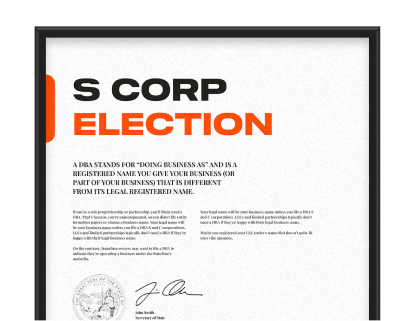Business Taxes
How Your LLC Will Be Taxed
In this guide, we’ll cover the main business taxes required in Delaware, including payroll, self-employment and federal taxes. The profits of an LLC aren’t taxed at the business level like C Corporations. Instead, taxes are as follows:
- Owners pay self-employment tax on business profits.
- Owners pay state income tax on any profits, minus state allowances or deductions.
- Owners pay federal income tax on any profits, minus federal allowances or deductions.
- Employers pay payroll tax on any wages they pay to employees.
- Employees pay state and federal taxes on their earnings.
Items 1 and 2 fall under pass-through taxation for any LLC owners, managers and members who receive profits from the business. Profits are reported on personal federal tax returns.
Looking for Someone to Do Your Company’s Taxes?
Bizee provides a complete Business Tax Filing service.
Get Help with Taxes
State Taxes for LLCs
There are three main types of state tax you have to pay to your state Division of Revenue: Delaware state income tax, gross receipts tax and franchise tax.
Delaware Income Tax
As a business owner, you’ll need to pay Delaware income tax on any money you pay to yourself. These earnings flow through to your personal tax return. You’ll be taxed at Delaware's standard rates, and you’ll also be able to apply regular allowances and deductions.
Any employees will also need to pay state income tax. Delaware has a graduated tax rate ranging from 2.2% to 5.55% for income under $60,000, and 6.60% for income of $60,000 or over.
Delaware Gross Receipts Tax
Unlike most states, Delaware does not impose a state or local sales tax. Delaware does however impose a gross receipts tax on the seller of goods (tangible or otherwise) or provider of services in the state. Unless otherwise specified, the term “gross receipts” comprises the total receipts of a business received from goods sold and services rendered in the State. There are no deductions for the cost of goods or property sold, labor costs, interest expense, discount paid, delivery costs, state or federal taxes, or any other expenses allowed.
Business and occupational gross receipts tax rates range from 0.0945% to 1.9914%, depending on the business activity. In instances where a taxpayer derives income from more than one type of activity, separate gross receipts tax reporting is required. The type of business activity additionally determines whether gross receipts tax is remitted monthly or quarterly.
Delaware Franchise Tax
The state of Delaware levies a tax on formed businesses and LLCs within the state for the privilege of incorporating in Delaware. The cost for LLCs is set at an annual fee of $300, and must be paid to the Delaware Division of Corporations.
Federal Taxes for LLCs
As the owner of an LLC, you must pay self-employment tax and federal income tax, both of which are levied as “pass-through taxation."
Federal taxes can be complicated, so speak to your accountant or professional tax preparer to ensure that your Delaware LLC is paying the correct amount.
Federal Self-Employment Tax
All members or managers who take profits out of the LLC must pay self-employment tax. This tax is administered by the Federal Insurance Contributions Act (FICA), and covers Social Security, Medicare and other benefits. The current self-employment tax rate is 15.3%.
You’ll be able to deduct some of your business expenses from your income when calculating how much self-employment tax you owe.
Here are some examples of how much self-employment tax you may need to pay, depending on your earnings:
- On profits of $45,000, you would pay self-employment tax of $6,885
- On profits of $65,000, you would pay self-employment tax of $9,945
- On profits of $85,000, you would pay self-employment tax of $13,005
- On profits of $105,000, you would pay self-employment tax of $16,065
Treating Your LLC as an S Corp Can Help You Save Money.
You can do this by making an “S Corporation Tax Election” with the IRS using Form 2553. We can file your Form 2553 with the IRS on your behalf.
Get My LLC Treated As an S Corp
Pay Less Self-Employment Tax by Treating Your LLC as an S Corporation
The Internal Revenue Service allows an LLC to be treated as an S Corporation for tax purposes, provided your business meets certain requirements. This can help you reduce the amount of self-employment tax you pay by allowing you to declare some of your income as salary and other income as distributions or withdrawals.
Speak to your accountant or professional tax preparer for more information on reducing your LLC self-employment tax through an S Corporation tax election.
Federal Income Tax
You must also pay regular federal income tax on any earnings you take out of your Delaware LLC. The amount of income tax you pay depends on your earnings, current income tax bracket, deductions and filing status.
You only pay federal income tax on profits you take out of the business, less certain deductions and allowances. This includes your tax-free amount, plus business expenses and other deductions for areas such as healthcare and some retirement plans.
Speak to your accountant for more information.
Employee and Employer Taxes
If you pay employees, there are some slightly different tax implications. Speak to your accountant to get clear guidance for your unique situation.
Employer Payroll Tax Withholding
All employers are required to withhold federal taxes from their employees’ wages. You’ll withhold 7.65% of their taxable wages, and your employees will also be responsible for 7.65%, adding up to the current federal tax rate of 15.3%.
Speak to your accountant for more information.
Employees May Need to File Tax Returns
Regardless of whether you withhold federal and state income tax, your employees may need to file their own tax returns.
Employee Insurance and Other Requirements
You may also need to pay insurance for any employees, such as employee compensation insurance or unemployment tax.
Other Taxes and Duties
Depending on your industry, you may be liable for certain other taxes and duties. For example, if you sell gasoline, you may need to pay a tax on any fuel you sell. Likewise, if you import or export goods, you may need to pay certain duties.
Speak to your accountant about any other taxes or duties you may need to withhold or pay.
Estimated Taxes
Most LLCs must pay estimated taxes throughout the year, depending on the amount of profit and income you expect to make. The most common types of estimated tax are:
- Federal income tax
- Federal self-employment tax
- Delaware income tax
Most LLCs will pay estimated taxes on a quarterly basis. Learn more on the IRS website, and speak to your accountant for more information.
FAQs on Delaware Business Taxes
Does Delaware Have a Sales Tax?
No, Delaware does not have a sales tax, but does levy a gross receipts tax. You can read more about it above.
Does Delaware Have a State Income Tax?
Yes, Delaware has a graduated state income tax. You can read more about it above.
Does Delaware Have a Franchise Tax?
Yes, Delaware has franchise tax. You can read more about it above.
Do I Need to Pay Estimated Taxes?
Yes. In most cases, you must pay estimated taxes to the state and federal governments. You can find more information above.
incorporate now
Launch your business with bizee
No Contracts. No Surprises. Only $0 + State Fee to Launch Your Business.
